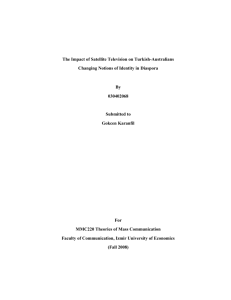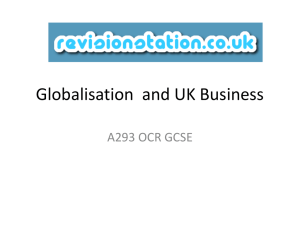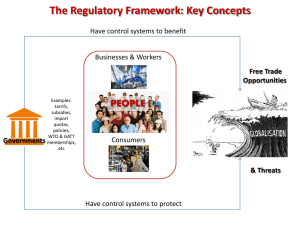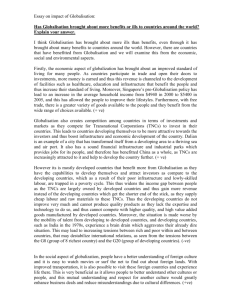DOC - Europa
advertisement
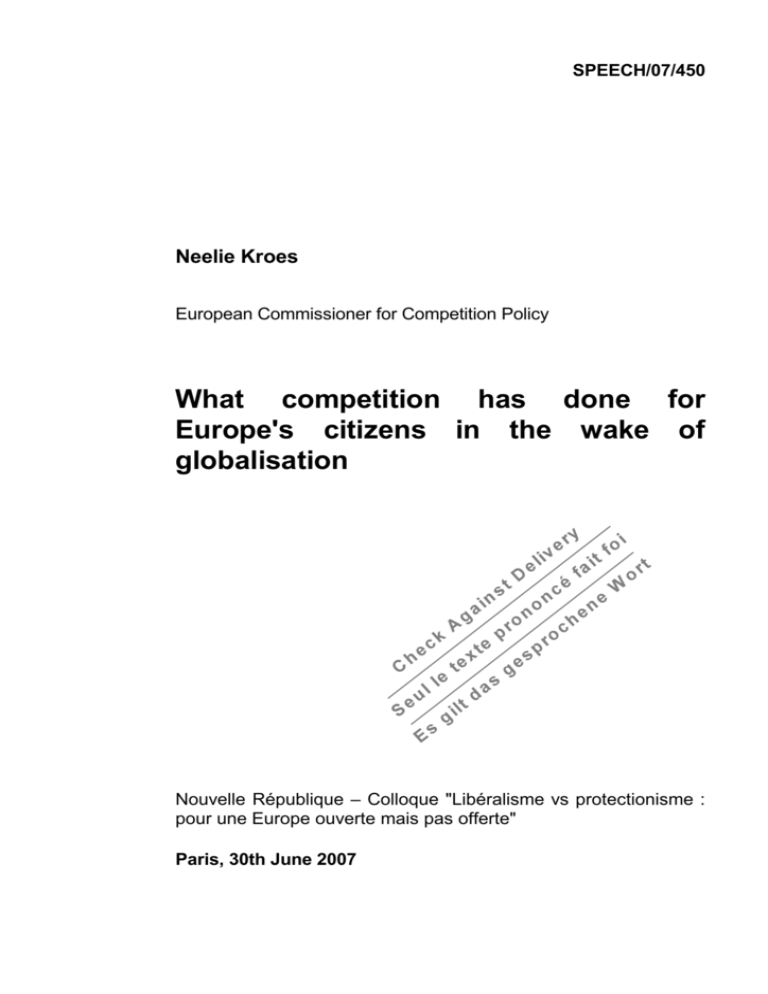
SPEECH/07/450 Neelie Kroes European Commissioner for Competition Policy What competition has done for Europe's citizens in the wake of globalisation Nouvelle République – Colloque "Libéralisme vs protectionisme : pour une Europe ouverte mais pas offerte" Paris, 30th June 2007 Mesdames, Messieurs, Je voudrais avant tout remercier Michel Barnier et « Nouvelle République » pour m'avoir invitée à m'exprimer devant vous ce matin. Monsieur le président, dans l'intérêt de la fluidité de nos débats, je m'exprimerai en anglais. When I received your kind invitation to speak about "An industrial ambition for Europe" in the context of an overall debate on "Liberalism vs. protectionism?", I was first a bit puzzled: After all, I am the Competition Commissioner. But I have accepted your invitation gladly – because I do believe that competition policy – which is my responsibility – can really help us distinguish the 'right' from the 'wrong' answers to the challenges and opportunities of globalisation. I intend therefore to clarify precisely what competition has done for Europe's citizens. Last week's European Council recognised just that, when it reconfirmed that, at the level of the Founding Treaties, a system ensuring undistorted competition forms an integral part of the Internal Market. This is why the Union has exclusive competence to set the necessary competition rules – and why I am with you here today. As we all know, globalisation is not a zero sum game. The “regional globalisation” in Europe over the last 50 years shows that fair and undistorted competition in an enlarged and free market works to the benefit of us all in terms of prosperity, choice and sustainable employment. Maintaining an open environment for business sustains and promotes competitiveness, and spurs productivity and growth. Free and fair, but vigorous competition, has been good for European business - and for Europe's citizens, as employees and as consumers. When we strive to get markets working better, it is not for the sake of an abstract notion of “free competition”. The real reason for our common competition rules is because better functioning markets provide citizens with better goods and better services, at better prices. When companies fix prices in markets like beer or elevators, customers pay higher prices and we all pick up the bill. When companies abuse a dominant position – like Microsoft - they not only exclude competitors but dampen innovation since other companies know however good their products are, they cannot compete on the merits. Our common rules ensure that such behaviour is outlawed across Europe, to the benefit of consumers and business. European companies have been enthusiastic in exploiting the advantages of an open internal market, by creating efficiencies of scale, diversifying, or growing into global players. Our common rules on merger control are the same for everyone. They certainly do not prevent the emergence of 'European champions' – just look at Veolia and Alcatel. Instead they allow champions to grow on their merits provided that they do not harm the interests of consumers (as the Ryanair takeover of Aer Lingus would have done). 2 The experience of globally successful European companies shows that Europe need not fear globalisation. The EU has defended its share of global trade and foreign direct investment better than other 'developed' regions. France is the best example, attracting more inward foreign investment than any other Member State. Between 2002 and 2006, France ranked 3rd in the world - right after China and the US – with 60% of foreign investments coming from the EU, and only 40% from the rest of the world. France also ranks first in the EU as regards outward investment. You are therefore clearly benefiting from globalisation - and so is the rest of the EU. But we also all know that there are adjustment problems. They are real, they are difficult and they should not be underestimated. To reap the benefits of globalisation, production structures have to shift to new areas of comparative advantage. This can hit certain sectors, regions or employment profiles. And it is not always easy for people to retrain or move between jobs, occupations or sectors. Adjustment – however necessary - can be costly and uncomfortable. This is why the burden of adjustment must be shared by all. In this complex debate, at the very heart of our citizens' legitimate concerns about the benefits of globalisation and its downsides, it is our duty as policy makers to distinguish the 'right' from the 'wrong' answers. Let me start with the 'wrong' ones: First and foremost, protectionism is not the answer. Protectionism almost inevitably leads to a downward spiral of retaliation. In the long run, we are all worse off. This is of course true of protectionist reflexes inside Europe. Undue nationalist meddling in cross-border mergers, building 'national champions' at others' expense, or propping up ailing companies with state aid, not only violate core Treaty provisions. They also hamper European market integration and handicap our industry in the global race - notably in key sectors like financial services or energy. The same is true of protectionist temptations towards the rest of the world: trying to shield jobs and industries from international competition, or building 'Fortress Europe', cannot be an option. This only reduces economic efficiency, income and employment opportunities – and weakens our hand in opening up third country markets to EU exports. The second of the many incorrect answers I will mention here is 'matching aid', trying to 'outbid' third countries for foreign investments. As we all know, business location decisions are primarily based on proximity to the market, availability and quality of the workforce, infrastructure and regulatory stability. State aid is far down the list of factors influencing investment decisions. 'Matching aid' is not just ineffective. It also hands windfall profits to mobile investors, erodes our cohesion policy and launches our Member States into devastating subsidy races. And let us not forget the WTO. Remember the Korean Shipbuilding panel? The EU lost this panel when it granted aid to "match" Korean aid. If we have problems with a WTO Member, we should follow the international route, not retaliate unilaterally. We cannot 'out-subsidise' the world. We should not even try. But this also means that we need to properly deal with unfair foreign subsidies. This is primarily a matter of trade policy and not of competition policy, and Peter Mandelson will be with you later today. But it is clear to me – and here we get to the right answers – that improving international discipline and responding to unfair foreign practices is the necessary complement to our internal discipline. 3 In my view, from a competition perspective, there are three 'right' policy answers to globalisation. We must: 1. Create and maintain the right framework for business in Europe, in the context of a global economy; 2. Help develop a global level playing field; and 3. Keep our markets open. All three aspects are equally important to help the many European businesses succeed that already operate globally, and encourage more European companies to engage in global trade. We need public policies that set the right signals. We need a strong common trade policy that allows us to secure a fair global playing field. But we also need free and fair competition at home so our companies learn from experience how to stand up to global competitive pressure. These objectives are nothing to be embarrassed about. They are there to provide the right conditions for companies to innovate and prosper, and so to increase the overall size of Europe's 'cake'. More 'cake' means more cash for governments to sustain the fabric of our societies, guarantee social justice for all and protect the natural environment and our cultural heritage for generations to come. In short, you could say that the bigger the cake, the better the means to protect the well-being of our citizens. Our sights are set high. Europe's industrial ambition needs to match them: We must enhance our ability to create new activities and jobs. This is what the renewed Lisbon Strategy is all about. But we must also find better ways to support the inevitable adjustment process: by investing more in education and training; significantly strengthening our research and development capabilities to enhance our innovative base; combining flexibility with security for workers (and not jobs); and finding new ways of coping with economic and social change. State aids policy plays a key role here. Properly balanced state aids discipline stops undue state intervention from distorting competition on the merits. But it also helps Member States target support where it brings best results to spur competitiveness or assist change. My State Aid Reform sets out to find the right balance between competition discipline and the legitimate needs of social, cultural, environmental or industrial restructuring. Our state aid rules are very refined: Member States can support training and employment, industrial restructuring or regional development, SMEs or in environmental technologies. Our new Research, Development and Innovation Framework contains all the necessary flexibility for Member States to significantly expand their research and innovation base – if only Member States used it! We could allow even more aid for projects of common European interest - as we have done for the Eurotunnel – if only Member States got together and launched such projects! 4 More generally, there is no doubt that well designed and well targeted state aid can accompany change and help companies face globalisation. But it can only do so as part of an overall policy mix. Several Member States are already doing the right things: investing in education and training; devising “flexicurity” models to help both their workers and their industry; or focusing state support on research, development and innovation. We the Commission – and I the Competition Commissioner – can of course not force your society to make the right choices. But I can tell you which options would be most promising – which is what I have just tried to do. Conclusion Ladies and Gentlemen, There are many reasons why protectionism does not help. I have highlighted a few. But if I have to pick the single most important reason, it is that protectionism is purely defensive. Protectionism 'helps' about as much as “la ligne Maginot” did, almost a century ago, when your country was faced with what you call “la guerre de mouvement”. Protectionism is static – but we need to be dynamic! We will only be successful in today’s competitive world if we define and defend our interests offensively. We will only be successful if we tackle the challenges of globalisation head-on – and focus on how to reap its benefits. Where are our strengths and competitive advantages? Where should we invest more and where should we stop investing? How to match flexibility with fairness and help equip people with the skills they need to succeed in a changing world? These are the questions we have to answer together if we want to be the first movers, the innovators, the people who are confident in their strength in international competition. If together we can achieve that, open Europe will be a net winner of globalisation for sure. 5


